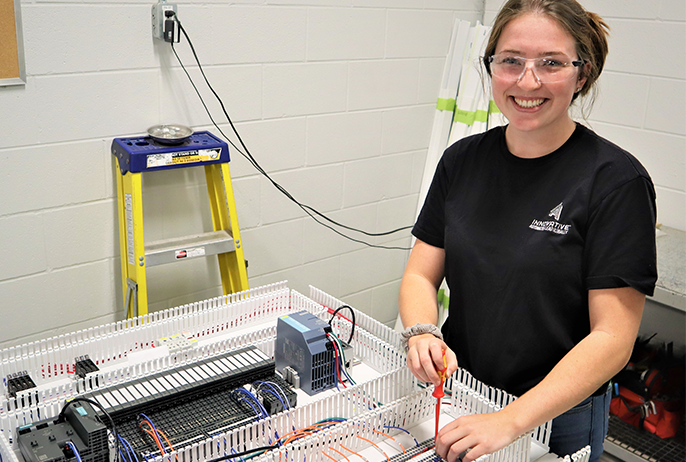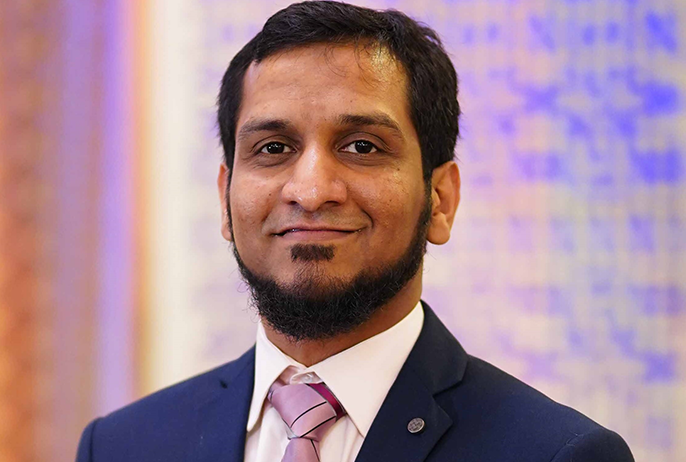Faculty Spotlight: Sean Madorin

We’re launching a fun new series on the blog, today. Our Faculty Spotlight series is designed to introduce you to the faces of the Lakehead-Georgian Partnership – a small, diverse and interesting collection of instructors – and tell you more about their personal and professional interests.
As you begin to explore your postsecondary education and the degree-diploma programs at Lakehead-Georgian, we’ll introduce you to the faculty members whose teaching and research will inspire and inform your education.
To kick off the series, we’re sitting down with Dr. Sean Madorin, co-ordinator of the Biotechnology–Health program at Georgian College, and program co-ordinator of the Applied Life Sciences program at Lakehead-Georgian. Sean has been a professor in the School of Health, Wellness and Sciences at Georgian since 2002.
Q. I found an online review for you that says you always have exciting ideas to share in class. Can you speak to that?
As much as I can, when I teach, I try to tell personal stories that help to illustrate an idea or concept. I also love sports and try to bring in stories relevant to pharmacology, physiology and pathophysiology, like stories on performance enhancing drugs. It makes the content a little more real, as students can see its application in real society.
Q. I’m told you have an interesting background in research, can you tell me more about that?
For my Ph.D thesis I did research on the role heart cells play in immune responses during sepsis. Bacterial or viral sepsis creates a systemic inflammation response that can affect the functioning of many organs including the heart. During sepsis, the heart often doesn’t pump as efficiently, but function returns to normal when sepsis resolves.
My research, however, focused on permanent injury to the heart that can result as a consequence of sepsis. White blood cells called neutrophils are drawn to the heart by secretions from heart cells, adhere to heart cells and cause permanent damage to those cells. The work I did was about determining the factors that cause this process and then finding ways to prevent this type of injury from occurring. It was fascinating and I really enjoyed performing the lab work that led to these discoveries.
Q. What’s the most exciting research you’ve ever participated in?
My thesis work was the most exciting for me personally. I was fortunate to be a part of another research group that looked at the function of the gastrointestinal (GI) tract during sepsis. During sepsis, blood flow is often reduced to the GI tract causing permanent damage to these tissues. We performed a number of experiments to route more blood to the GI tract through the use of different medications and novel delivery systems for those medications.
Q. Can you tell me about some of your career highlights?
Being involved with the Lakehead-Georgian Partnership. Working on connecting the two of them together has been very rewarding. I’ve enjoyed seeing how the initial steps developed into a larger partnership.
At Georgian College, I also helped launch the Primary Paramedic, Pharmacy Technician, Biotechnology and Veterinary Assistant programs. I had some involvement in the Denturism program as well. I’m very proud of these programs—it’s been great to see this initial work develop into the programs that they are today.
Q. Did you always want to be a professor?
I wanted to be a medical doctor when I was younger, but in grad school I got much more interested in being a teacher through experiences as a teaching assistant. I really enjoy the interaction with students—it’s my favourite part of being a professor.
Q: What can students expect from their Lakehead-Georgian classes?
Students can expect to actively participate in some unique lab activities utilizing data acquisition equipment to explore elements of neurophysiology, muscle physiology, cardiovascular and respiratory physiology. The labs are fun, really valuable learning experiences!
Q. Any skills or talents we may not know about?
I love sports. I still play volleyball, squash and hockey and I coach basketball and soccer. I love to teach and coach. Both are opportunities to help people develop their skills, knowledge and love for science and sports.
Q. What do you like to do when you’re not working?
Hanging out at home with my family and our dog. I also like working at projects around the house. I recently did a full-on renovation of a large room in our house, right down to the flooring and baseboards. I like being busy and moving things forward, making them better, even if only a little bit at a time.
Q. Can you tell me about your family?
I have 21-year-old twins, Emma and Spencer, who came home from university last March due to COVID. Carter is in Grade 12 and making plans for university. Depending on what happens with the pandemic, my wife Sandy and I are preparing to be empty nesters in the fall. Sandy is also a professor at Georgian for the Practical Nursing program.
Q. Do you talk shop a lot over the dinner table?
We mostly talk about work when we are walking the dogs in the morning.
You can find Sean Madorin on twitter at https://www.twitter.com/smadorin.


